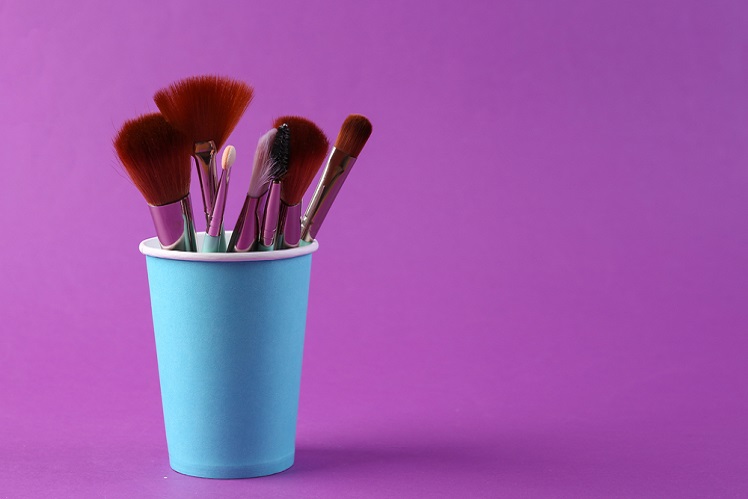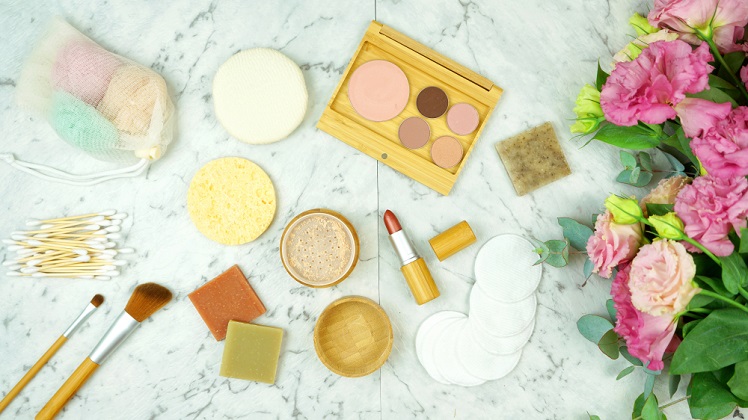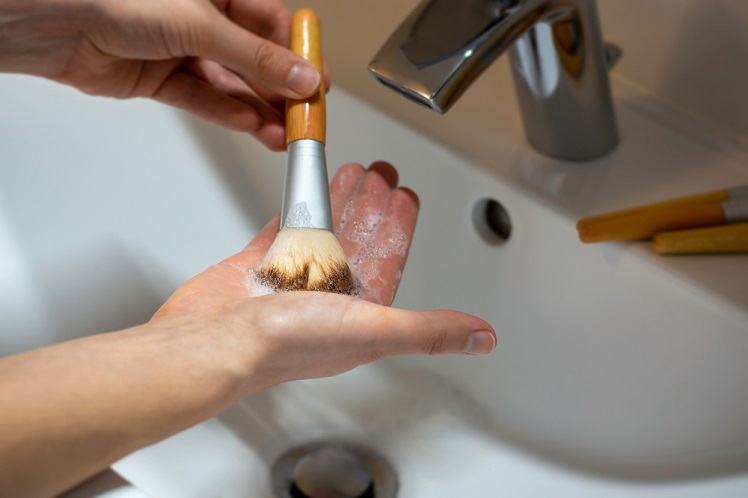To dispose of makeup brushes properly, repurpose them for other uses or dispose of non-biodegradable brushes in the trash. Biodegradable brushes, like those with natural bristles, can be composted.
Like cosmetics, makeup brushes have a shelf life. Nevertheless, makeup brushes last a long time, especially if you know how to take care of them, unlike makeups which may have a shorter lifespan. When you find their bristles are consistently falling apart or becoming stiff and hard, then it’s a sign to dispose of your makeup brushes. Besides, they may smell awfully bad because of chemical ingredients and bacteria on your old makeup brushes.
Many people are aware to dispose of expired cosmetics, but not their makeup brushes. In fact, expired makeup brushes contain chemical ingredients and bacteria which can harm your skin. If you don’t know how to dispose of makeup brushes the right ways, it may cause skin problems and even global environmental issues.
So, it’s important to know more about them and how to dispose of makeup brushes safely.
Key Takeaways
- Makeup brushes can contain harmful chemicals and bacteria, which become problematic when they expire.
- Disposing of makeup brushes in an environmentally friendly way is crucial, as they can contribute to landfill issues.
- Natural makeup brushes can be composted due to their biodegradability.
- Creative repurposing of old makeup brushes is encouraged to avoid wastage.
- For environmentally conscious alternatives, consider using eco-friendly makeup brushes made from sustainable materials.
Table of Contents
Makeup Brushes
Makeup brushes are an essential tool in the beauty industry. They are used to apply makeup or paint the face. Usually, the handle is typically constructed of plastic or wood and the bristles themselves may be made of natural or synthetic materials.
If you want to throw away makeup brushes, these materials should be disposed of the right way. Let’s take a look at the following points below to give you better understanding about your old makeup brushes.

1. What are Makeup Brushes Made of?
There are three components that make up a cosmetic brush: the handle, the ferrule, and the bristles. The most common materials for handles are resin, plastic, and wood. Almost always, the ferrule is constructed of metal.
When it comes to flawless application, bristles can make or break your appearance. Therefore, you should select the right bristle materials that create your makeup brushes. Based on the bristle materials they are made of, makeup brushes can be divided into natural and synthetic makeup brushes. Here, we outline how they differ from one another.
2. Natural Makeup Brushes
Natural makeup brushes are typically made of animal hair. commonly sable, squirrel, or goat. And for that reason, they are more expensive than synthetic brushes. Since they use the actual hair, natural makeup brushes feel incredibly silky and make blending simple.
The natural hair on the makeup brush has cuticles, just like the hair on our heads, which aid in lifting and absorbing powdery color and blending it seamlessly across the face to provide a natural, non-blotchy appearance.
3. Synthetic Makeup Brushes
Synthetic makeup brushes are frequently made of materials like nylon, taklon or polyester fibers. Synthetic makeup brushes are often more inexpensive since they employ readily available materials, even though they aren’t as soft as natural brushes. Their bristles naturally move closer one another, making for a more precise, smooth, and streak-free application.
4. Harmful Chemical in Makeup Brushes
Generally, synthetic bristles are made of chemical ingredients such as nylon and polyester which are safe for skin but can harm the environment if they are not disposed of correctly. Their bristles are safe for skin if they are still in the right shape and clean.
When your makeup brushes expire, they also build up gunk and grime from old makeup accumulation on the bristles. As a result, your makeup brushes will be stiff and contain bacteria which will irritate your skin.

In addition, the ferrule of your makeup brushes also may have harmful chemicals. Since they are made of metal, they can contain dangerous heavy metals such as nickel and chrome. Moreover, heavy metals are known as neurotoxins that have been related to brain damage.
5. What does Using Expired Makeup Brushes do?
We don’t recommend you to use expired makeup brushes. Although makeup brushes don’t have expired dates like mascara or sunscreen, you should replace them every 2-3 years to prevent undesirable impacts such as redness and irritation on your skin. Especially if you don’t clean them regularly, expired bacteria in the makeup brushes will harm your skin.
In fact, bacteria can quickly multiply in a brush and result in acne breakouts or other illnesses. Another frequent problem with old brushes is mold, which develops as a result of moisture accumulation inside them over time.
6. How Many Makeup Brushes We are Using?
In general, the most recent statistics from Zero Waste Week show that 120 billion units of beauty materials are used annually. That includes materials like plastic, paper, glass, and metals, which 70% are dumped in landfills every year. And, makeup brushes contain plastics and metals which also cause beauty waste.
In addition, the production of makeup brushes also create a giant carbon footprint for transferring ingredients and finished goods.
Furthermore, makeup brushes’ bristles are made of plastic and nylon which contribute to the beauty industry waste each year. In fact, plastic waste accounted for 70% of the industry’s waste. According to Zerraco, 7.9 billion rigid plastic units were produced for the cosmetics sector in the United States alone.
Additionally, according to the Resource, if everyone changed their brushes every three months, there might be 264 million brushes thrown out annually in the UK alone.
How Long Do Makeup Brushes Take to Disintegrate?
The time will depend on the materials that make the makeup brushes. Of course, natural makeup brushes will be faster to disintegrate compared to synthetic ones. Bristles made of animal hair will naturally decompose within two years if buried in soil.
The procedure will proceed more quickly if exposed to adverse weather conditions like rain, wind, snow, humidity, and direct sunshine.

On the other hand, synthetic bristles that are made of nylon or polyester will take years to disintegrate. In fact, polyester will take more than 500 years to degrade compared to 30 to 40 years for nylon fabric.
Makeup Brushes Environmental Problems
Using conventional cosmetics brushes harms both the environment and animals because they are made with animal hair and plastic bristles. Here are some environmental problems you’ll get when using makeup brushes.
1. Microplastic and Ocean Contamination
Ocean pollution is caused by materials used in the life cycle of a cosmetics brush. Microplastics from polyester, which is used to manufacture bristles, are in our water and are being ingested by marine life.
2. Animals Cruelty
As you are aware, the majority of beauty brushes are manufactured with genuine animal hair bristles. Frequently, the farmers who rear and harvest the animals used to make cosmetic brushes don’t give much thought to the conditions in which the animals are kept. By using natural makeup brushes, you may support animal cruelty.
3. Landfill Problem
Many makeup brushes have synthetic bristles, which do not biodegrade and remain in landfills indefinitely. Since synthetic makeup brushes take years to disintegrate, disposing them directly will also cause the landfill problem.
The Right Ways on How to Dispose Makeup Brushes
Are you trying to decide how to get rid of your used cosmetic brushes? You can’t simply throw them away since they are usually difficult to degrade. Besides, old makeup brushes may contain many bacteria and germs, so they should be disposed of safely.

Here are a few ways on how to dispose of makeup brushes properly:
1. Dispose Them in Your Local Treatment Plant
Since makeup brushes are difficult to disintegrate, you should dispose of them with a proper treatment. Make contact with your neighborhood trash management firm for disposal support. This is the safest way to recycle your makeup brushes.
2. Place Them in Recycling Bin for Hazardous Waste
When it comes to recycling, simply throw your makeup brushes in the recycling trash for hazardous waste. As you know, chemical ingredients and bacteria from makeup brushes may harm the environment if you only bury them in soil. It will be a simple way to recycle your old brushes.
3. Compost Natural Makeup Brushes
Making a compost is a great disposal idea for natural makeup brushes. If you have a compost pile at home or work, bury them in it. Before that, make sure to clean them to prevent any bacteria or chemicals left.
4. Recycle Your Makeup Brushes
When you think of creative ways to dispose of your old makeup brushes, makeup recycling or repurposing them into another form of art would be fantastic. For instance, upcycle your brushes for painting, applying adhesive, or even dying wood.
Alternatively, you can upcycle your brushes to maintain healthy plants by using a powder brush to dust the leaves and smaller brushes to keep dead leaves away from the roots.
Makeup Brushes Alternatives
Although makeup brushes seem to be an essential equipment, there are many makeup brushes alternatives which are safer for your skin and also the planet. Therefore, we have compiled some environmental friendly options to replace your traditional makeup brushes. Here are eco-friendly brushes alternatives you should try for your next makeup!

1. Cotton Swab
Simply swap out your pencil and smudge brushes for cotton swabs. You can use cotton swabs to smudge out your kajal, add eyeshadow to your lower or upper lash line, or simply set your kajal with eyeshadow for a long-lasting look. Because they are made of cotton, cotton swabs are also a safer option for the environment.
2. Recycled Tissue Paper
Yes, you may easily substitute powder and blush brushes with recycled tissue papers. Use the tissue paper that has been folded into a triangle form to apply blush or powder. Sweep a fresh tissue on your skin to remove the overdone blushes. Besides, they are also an eco-friendly product.
3. Eco-Friendly Makeup Brushes
If you aren’t satisfied with the results from these products above, you can choose the eco-friendly makeup brushes. Check the label if they are cruelty-free and vegan makeup brushes. For instance, the 100% Pure is a makeup brush brand made of recycled plastic bottles. Besides, there are no animals harmed during the production.
Final Thought
Getting rid of makeup brushes is a bit tricky since they are made of materials which are difficult to decompose. You should learn how to dispose of makeup brushes safely before they are thrown away to the environment.
Otherwise, they may lead to a serious and bigger environmental problem in future. We hope this article will help you take care of your old makeup brushes safely.
Latest Post:
- Bioplastic Pros and Cons: An Unbiased Examination
- Eco-Friendly Bottling: Aluminum as the Sustainable Hero?
- How to Make Bioplastic from Rice: A Step-by-Step Guide
- Eco-Tips: How to Recycle Amazon Envelopes?
- What Does Compostable Mean?
FAQs (Frequently Asked Questions)
Should you throw away makeup brushes?
If you find that your makeup brushes become stiff or produce a bad smell, then you should replace them with a new one. However, you can’t simply throw them away. You need a serious disposal strategy when to throw away.
If you can’t throw them out to the right disposal bin, you can also recycle your makeup brushes. For more tips on how to dispose of makeup brushes, you can read in the article above.
Can unused makeup brushes expire?
Well, as makeup brushes don’t have a specific expired date, the answer is depending on their condition. Your unused makeup brushes last for a longer time if you keep them in the dry condition. However, if you keep them in a high-moisture environment, which is perfect for mold growth, they may also exhibit signs of being expired products.
What happens if you don’t wash your makeup brushes?
Everytime you apply the brush to your skin, it will contain your dead cells and makeup. So, our makeup brush is going to be an ideal place for bacteria to grow. You can transport bacteria and grime from your face to your makeup and back to your face if you don’t thoroughly wash your makeup brushes.
When should you throw away makeup brushes?
We advise changing your makeup brushes every two to three years. Moreover, application brushes, blush, bronzer, and eyeshadow brushes all require weekly washing for maintenance. If you don’t clean them regularly, you may find your makeup brushes expire faster.
